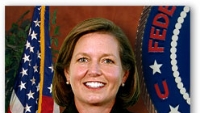FCC commissioner won’t rule out reallocating some TV spectrum for wireless use
The professional video industry's #1 source for news, trends and product and tech information. Sign up below.
You are now subscribed
Your newsletter sign-up was successful

When it comes to the spectrum required to advance wireless broadband Internet service, all ideas should be on the table, including reallocating spectrum currently used for broadcast television, said FCC commissioner Meredith Attwell Baker on a C-SPAN television show.
“I don’t expect that we take all of the broadcasters’ spectrum, but I expect there might be some in there that might be more efficiently used in a commercial wireless sense,” said Baker, one of two Republican commissioners.
Baker, who was interviewed on “The Communicators,” a C-SPAN television program that aired Nov. 28, added that in developing its national broadband plan, the commission may be able to “come up with a solution that’s a win-win” with respect to broadcast interests and expanded wireless coverage, although she offered no details.
“Broadcasters actually have 294MHz of spectrum,” she said. “What we’re talking about for these future (wireless) networks is that we are going to need in the range of 800MHz so it’s not the golden egg. I think it (broadcast spectrum) might be part of the solution.”
The FCC is working under a Congressional mandate to complete a plan by Feb. 17, 2010, laying out how to make broadband service — via wireless and wireline service — ubiquitous in the nation. Some filings with the commission from wireless industry interests and others have proposed stripping TV broadcasters of some or all of their spectrum and reallocating that bandwidth to next-generation wireless broadband service.
While currently the frequency allocated for wireless service is adequate, it won’t be sufficient to meet future demand, Baker said on the show. Today there are 270 mobile phone subscribers, of which about 40 million are Internet broadband subscribers, she said. Ninety-three percent of mobile Internet subscribers are 18 to 29 years old, said Baker, who formerly headed the Commerce Department’s National Telecommunications and Information Administration (NTIA) and was sworn in as an FCC commissioner July 31.
“So our crisis is not today, but it is going to be coming around the corner pretty quickly. We need to lay the groundwork by 2020 when everyone accesses the Internet by mobile (so) that we are prepared and America remains competitive,” she said.
The professional video industry's #1 source for news, trends and product and tech information. Sign up below.
During the show, the FCC commissioner also suggested that wireless microphones spectrum users may be moved from TV white spaces to clear the way for unlicensed white space devices. However, doing so is part of the larger issue of frequency allocation that requires long-range planning, she added.
